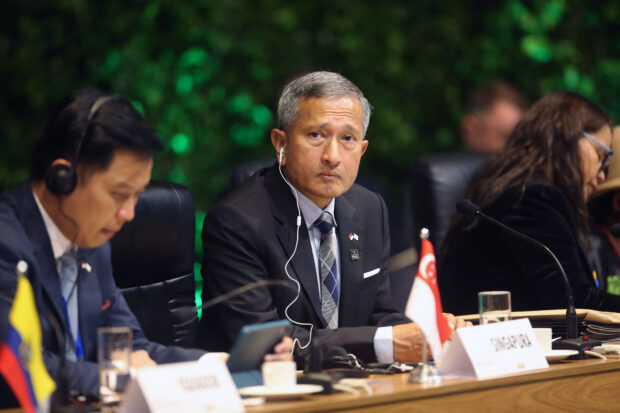
Singaporean Foreign Minister Vivian Balakrishnan DANIEL RAMALHO/AFP
MANILA, Philippines — High ranking foreign affairs officials of the Philippines and Singapore had an “extensive discussion” on the South China Sea row on Tuesday, maintaining that peace in the area is “beneficial” to both nations.
Department of Foreign Affairs chief Enrique Manalo, in a press conference, said he and Singapore’s Minister for Foreign Affairs Dr. Vivian Balakrishnan engaged in an “open and dynamic” discussion on matters of mutual interest between the Philippines and Singapore during their meeting.
READ: Singapore foreign minister arrives April 15
“I briefed the Foreign Minister on the Philippines’ position on the South China Sea, which has been consistent, clear, and firmly anchored on the 1982 United Nations Convention on the Law of the Sea and the final and binding 2016 Arbitral Award on the South China Sea,” said Manalo.
Peaceful dialogue and diplomacy
“I shared that the Philippines remains committed to peaceful dialogue and diplomacy. We are also committed to making our bilateral mechanisms with other claimant states work, and we are steadfast in our adherence to the 2002 Asean-China Declaration on the Conduct of Parties in the South China Sea and are committed to an effective and substantive Code of Conduct based on the 1982 Unclos. We agreed that peace in the South China Sea is beneficial to both the Philippines and Singapore, as well as to our entire region,” he added.
Apart from the South China Sea, the two foreign affairs executives expressed their nations’ devotion to deepen its mutual defense, security, and maritime cooperation.
Manalo said the two countries would also work on collaborating on new fields of cooperation—such as, but not limited to, climate change, energy transition, renewable energy and energy connectivity; emerging technologies including Artificial Intelligence, and health.
The two leaders likewise tackled the heightened tensions in the Middle East—particularly Gaza and the recent developments concerning Iran and Israel.